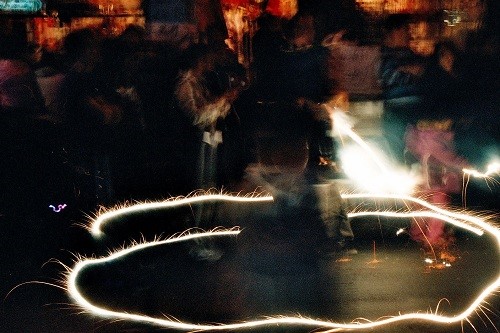 1.
1.
At breakfast this morning a story about forty-three children dead in a Mexican daycare fire. How the death toll keeps rising. How the details accrete. How their parents crashed cars into the building to get them out. I had been avoiding this news story purposely, fingering the soft satin edge of my limits, going no further than necessary, averting both response and memory. But now I am trapped by it over poached eggs and asparagus and biscuits with jam. Nodding smile, fingers gripping arms, holding myself. Rocking, rocking. Mind flying, trying to distract itself from the image–yes, even now, push it out, out and away—the bright orange image of 43 children, babies, fire, skin, char, cars through walls and the wails on either side. The women at the table, their eyes fly to mine. He keeps talking. Burn victims flown to Sacramento. Just a few survivors, and of those, most burned over their entire bodies. Horrible. Isn’t it horrible? Trapped. A woman turns, says, nodding toward me, “You know, she has little ones at home.” Turns back, holds me in her fierce, kind stare.
2.
After school, September, senior year, we opt not to stop for ice cream but instead head home. On the way the smell of hot asphalt, of roasting marshmallow, of burnt popcorn. Park the car in my driveway, woods all around. A loud pop from the back yard. A chained dog’s frenzied bark. Flames to the second-story window. Windows shut from the wind that might have blown it in. My sister and my friend screech panicked laps around the kitchen. Run for the woods! On the phone, the operator intones, Oh honey, help is coming. Where is the baking soda? Don’t be stupid, Sheila. After extinguishment, wheels melted to asphalt. No line of demarcation between. We could have been in that car. We would have been in that car. Called home from his faraway office, my father parks his car halfway up the drive. Business-suited and serious, he looks at the vinyl siding, sliding, says, “Look what you did to my house.”
3.
There is no reason for this daymare, not sparked by the news or by dream image. Still, I see my son, in his bed, behind a wall of flame. I see through it, cannot breach it. He cries for me. Mama, mama. I contract on my bed, knees tucked up under my chin. Rocking. Rocking. Worse, somehow, than if he were still an infant. Synapses not yet connective, words for pain and fear and love not yet formed. Worse, even, than if he were older with full knowledge then upon him. That the world can burn. That we return to ash.
4.
Bicentennial summer, 1976. The fourth of July at dusk. My young uncles lighting smoke bombs, lobbing them over the barbed wire fence in our back yard. They send colorful contrails behind them before sputtering out. Except that one. That one lands beneath the pine tree, settles into a sea of dry needles that ignite. The youngest uncle scrambles to the top, flings his body over, goring his forearms. Stamps the small fire out and then bleeds back over. That night, I let a sparkler burn down too far, scorching the thin skin between index finger and thumb.
5.
1977 in my childhood bedroom. Peering in through a scrim of sooty memory.
There, pink and green grosgrain I draped over a bedroom lampshade to create soft, colored light.
There, a crisp, brown-edged burn through pastel thread; a circle of extinguished danger, discovered just before the spark.
6.
Cold December morning. My son’s daycare teacher outside my car window, cooing over my newborn daughter. Does she sleep? Do you? How do you find it now with two? Our happy chit chat, and in it, her mention of twin boys. I say the expected: wow, twins! How old are they? And comes the kind eyes, the impossible answer. There was a house fire. They would have been nine … And as in a fire, the air is sucked from the room of my lungs. I want to wail. I cry in the car, and this mother whose babies burned looks in on me and my child, smiles and soothes, “It’s okay now. We go on.” But I can’t. Collapse against the steering wheel when she leaves, watch her walk into the school, hear children’s crystalline laughter lifting, stretch to reach my baby in the back seat. Sleep. Breathe. Breathe.
—
Sheila Squillante writes poems and essays and is happy to have had some of them appear in places like Waccamaw: A Journal of Contemporary Literature, Literary Mama, Glamour Magazine, Phoebe, No Tell Motel, Cream City Review and elsewhere. Her work has been nominated for Best American Essays, Dzanc’s Best of the Web and a Pushcart Prize. She is the author of two chapbooks of poetry, A Woman Traces the Shoreline (Dancing Girl Press, 2011), and Women Who Pawn Their Jewelry (Finishing Line Press, forthcoming 2012), as well as Another Beginning, a limited edition artist’s book of her poetry and the experimental photography of her husband, Paul Bilger (Kattywompus Press, forthcoming, 2012). She lives in central Pennsylvania with her family and invites you to visit her anytime at www.sheilasquillante.com.
Photo by Maria Romasco-Moore
